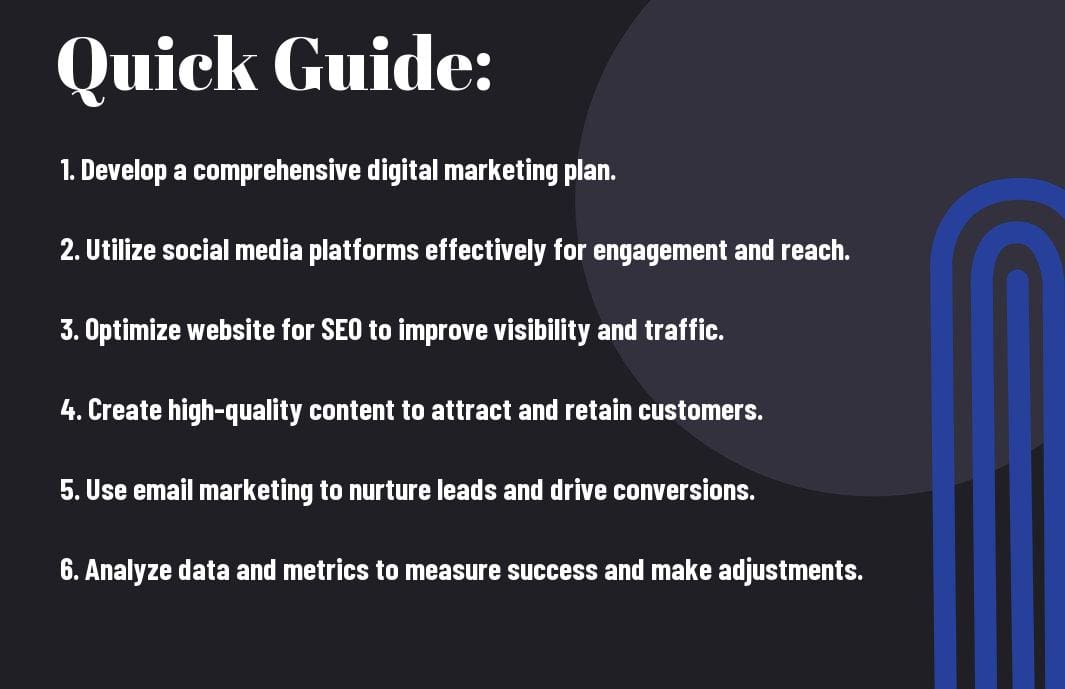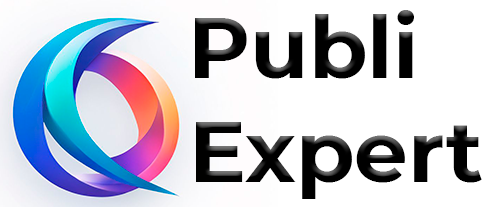This comprehensive guide will provide you with necessary strategies to excel in the ever-evolving world of digital marketing. In today’s competitive landscape, understanding and implementing the right strategies can make all the difference in the success of your marketing campaigns. Whether you are a seasoned marketing professional looking to enhance your skills or a novice eager to learn the ropes, this guide will equip you with the tools and knowledge needed to stand out in the digital realm.
Key Takeaways:
- Understanding Your Audience: It is crucial to identify your target audience and tailor your digital marketing strategies to meet their needs and preferences.
- Multi-Channel Approach: Utilizing a combination of different digital marketing channels, such as social media, email marketing, and SEO, can help reach a wider audience and maximize your online presence.
- Continuous Optimization: Regularly analyze and optimize your digital marketing strategies based on performance metrics and customer feedback to ensure long-term success and growth.

Fundamentals of Digital Marketing
Core Elements of Digital Marketing
Now, let’s probe the core elements of digital marketing that form the foundation of any successful campaign. Digital marketing involves a combination of strategies, tactics, and tools to reach and engage with your target audience online. It includes various channels such as social media, email, content marketing, search engine optimization (SEO), paid advertising, and more.
Identifying Your Target Audience
Marketing is all about understanding your audience and catering to their needs and preferences. Identifying your target audience is crucial for the success of your digital marketing efforts. By defining your target demographic, interests, behavior, and pain points, you can create personalized and relevant content that resonates with them.
Audience segmentation allows you to tailor your messaging, offers, and promotions to different groups effectively. By understanding your target audience on a deeper level, you can optimize your digital marketing campaigns for better engagement, conversion rates, and overall success.
Types of Digital Marketing Channels
Once again, let’s investigate the various digital marketing channels that can help your business succeed online. Understanding the different avenues available to reach your target audience is crucial for developing a comprehensive digital marketing strategy. Knowing which channels to focus on can make a significant impact on your overall marketing efforts.
| Search Engine Optimization (SEO) | Pay-Per-Click Advertising (PPC) |
| Social Media Marketing | Email Marketing |
| Content Marketing | Mobile Marketing |
Search Engine Optimization (SEO)
Assuming you want to improve your website’s visibility on search engines like Google, SEO is necessary. By optimizing your website with relevant keywords, high-quality content, and backlinks, you can increase your organic search rankings and drive more traffic to your site. Search engine algorithms are constantly evolving, so staying up-to-date with the latest SEO trends and best practices is crucial for long-term success.
Pay-Per-Click Advertising (PPC)
Digital advertising through PPC allows you to reach your target audience through paid ads displayed on search engine results pages or social media platforms. With PPC, you only pay when users click on your ads, making it a cost-effective way to drive traffic to your website and generate leads or sales. Understanding how to create compelling ad copy, target the right keywords, and optimize your campaign can help you maximize your PPC efforts.
Search Engine Optimization (SEO) is a powerful tool to drive organic traffic to your website. By optimizing your site for search engines, you can improve your visibility and attract more potential customers.
Social Media Marketing
An integral part of any digital marketing strategy, social media marketing allows businesses to connect with their audience on platforms like Facebook, Instagram, and Twitter. By creating engaging content, running targeted ads, and interacting with followers, you can build brand awareness, drive website traffic, and generate leads. An active presence on social media can help you establish trust and credibility with your target audience.
PayPerClick Advertising (PPC) is a quick way to get your business in front of potential customers. By bidding on keywords related to your products or services, you can ensure your ads appear prominently in search results.
Email Marketing
Email marketing remains one of the most effective ways to communicate with your audience and nurture leads. By sending personalized emails with valuable content, promotions, and updates, you can drive engagement and conversions. Social media channels may come and go, but email continues to be a reliable channel for building relationships with customers and driving sales.
Optimization is key in email marketing. By testing different subject lines, content formats, and sending times, you can optimize your email campaigns for maximum engagement and conversion rates.
Content Marketing
Crafting compelling and relevant content is necessary for attracting and engaging your target audience. Content marketing involves creating and sharing valuable content such as blog posts, videos, infographics, and more to educate and entertain your audience. Organic content that resonates with your audience can help boost brand awareness, drive website traffic, and ultimately convert leads into customers.
Campaigns that focus on content marketing should be tailored to your target audience’s preferences and interests, providing them with valuable information that solves their problems or entertains them.
Step-by-Step Digital Marketing Strategy Development
All successful digital marketing campaigns start with a well-thought-out strategy. From setting specific goals to creating a comprehensive plan, every step plays a crucial role in achieving success in the digital landscape. In this chapter, we will walk you through the crucial steps of developing a digital marketing strategy that drives results.
| Setting SMART Digital Marketing Goals | Creating a Comprehensive Digital Marketing Plan |
| For businesses to succeed in digital marketing, it is imperative to set SMART goals. These goals should be Specific, Measurable, Achievable, Relevant, and Time-bound. By defining clear objectives, businesses can track their progress and make necessary adjustments to their strategies to ensure success. | If you want your digital marketing efforts to yield the best results, you need a comprehensive plan that outlines your tactics and channels. A digital marketing plan should include a detailed analysis of your target audience, competitive landscape, key performance indicators, and a timeline for implementation. This roadmap will guide your actions and help you stay on track towards achieving your marketing goals. |
Setting SMART Digital Marketing Goals
For businesses to succeed in digital marketing, it is imperative to set SMART goals. These goals should be Specific, Measurable, Achievable, Relevant, and Time-bound. By defining clear objectives, businesses can track their progress and make necessary adjustments to their strategies to ensure success.
Creating a Comprehensive Digital Marketing Plan
If you want your digital marketing efforts to yield the best results, you need a comprehensive plan that outlines your tactics and channels. A digital marketing plan should include a detailed analysis of your target audience, competitive landscape, key performance indicators, and a timeline for implementation. This roadmap will guide your actions and help you stay on track towards achieving your marketing goals.
Marketing Tip: When creating your digital marketing plan, consider all potential risks and opportunities. Conduct a thorough SWOT analysis to identify the most critical factors that could impact your strategy. By being aware of these aspects, you can proactively address challenges and leverage strengths to maximize the effectiveness of your digital campaigns.
Tips for Successful Digital Marketing Campaigns
Despite the ever-evolving landscape of digital marketing, there are several strategies that remain consistent for success. Implementing these tips can help you create impactful and successful digital marketing campaigns that drive results.
Personalization and User Experience
Any successful digital marketing campaign starts with personalization and delivering an exceptional user experience. Tailoring your content and messages to individual audiences can significantly increase engagement and conversion rates. By understanding your target audience and analyzing their behavior, you can create personalized campaigns that resonate with users.
Utilizing Data and Analytics for Decision Making
Assuming that the foundation of a successful digital marketing campaign lies in data and analytics. By leveraging data insights and analytics tools, you can make informed decisions that drive campaign performance. Understanding metrics such as click-through rates, conversion rates, and ROI can help you optimize your campaigns for maximum impact.
Successful digital marketers rely on data-driven decisions to continually refine their strategies and improve results. By tracking and analyzing key performance indicators, you can uncover valuable insights that guide your marketing efforts toward success.
A/B Testing and Campaign Optimization
You can enhance the performance of your digital marketing campaigns through A/B testing and ongoing optimization. By testing different variables such as ad copy, images, and landing pages, you can identify what resonates best with your audience. This iterative process allows you to refine your campaigns for maximum effectiveness.
User engagement and conversion rates can be significantly improved through A/B testing and ongoing optimization. By constantly testing, measuring, and adjusting your campaigns, you can ensure that you are delivering the most relevant and compelling content to your audience.
Factors Influencing Digital Marketing
Your digital marketing strategies are constantly influenced by a multitude of factors that can impact the success of your campaigns. Understanding these factors is crucial for leveraging them to your advantage and staying ahead in the competitive digital landscape. Here are some key factors to consider:
- Technological Advances and Trends: Rapid technological advancements and emerging trends play a pivotal role in shaping digital marketing strategies. Keeping abreast of the latest technologies such as artificial intelligence, virtual reality, and voice search can give you a competitive edge in reaching your target audience.
- Legal and Ethical Considerations: Compliance with legal and ethical standards is necessary for maintaining the trust of your audience and avoiding potential penalties. Data privacy regulations like GDPR and ethical considerations around online advertising practices should be carefully adhered to.
Technological Advances and Trends
Advances in technology have revolutionized the way businesses connect with consumers online. From personalized marketing automation tools to innovative social media platforms, staying updated on the latest trends is key to staying relevant and engaging with your target audience effectively. Companies that embrace new technologies and trends often experience higher levels of engagement and conversion rates in their digital marketing efforts.
Legal and Ethical Considerations
For any digital marketing strategy to be successful, it must also consider the legal and ethical implications of its practices. Violating privacy laws or engaging in deceptive advertising can have severe consequences for your brand reputation and bottom line. Transparency, honesty, and adherence to legal guidelines are paramount in building a trustworthy relationship with your audience. Perceiving the Ultimate Guide to Digital Marketing can provide further insights into navigating these complex issues.
The Ultimate Guide To Digital Marketing – Strategies For Success
Advantages of Embracing Digital Strategies
Now, let’s research into the advantages of embracing digital marketing strategies. Digital marketing offers a wide range of benefits, including a global reach, cost-effectiveness, measurable results, targeted marketing, and real-time customer engagement. With digital strategies, businesses can reach a larger audience and target their ideal customers with precision.
| Pros | Cons |
| Global Reach | Security Concerns |
| Cost-Effectiveness | Information Overload |
| Measurable Results | Technical Challenges |
| Targeted Marketing | Privacy Issues |
| Real-Time Customer Engagement | Intense Competition |
Challenges and Limitations in Digital Marketing
Digital marketing also poses its own set of challenges and limitations. With the rise of cyber threats, businesses need to address security concerns to protect customer data and brand reputation. Moreover, the abundance of information available online can lead to information overload, making it challenging for businesses to stand out in a crowded digital landscape.
Marketing: It is crucial for businesses to stay updated on the latest digital marketing trends and technologies to overcome these challenges while leveraging the power of digital strategies to drive success.
Measuring and Analyzing Digital Marketing Success
Now, in the world of digital marketing, it’s vital to track and analyze the success of your strategies to ensure they are effective. If you are looking for a comprehensive guide on digital marketing strategies, check out The Ultimate Guide to Digital Marketing Strategy for Success. This chapter will focus on measuring and analyzing the performance of your digital marketing efforts.
Key Performance Indicators (KPIs)
One of the crucial aspects of analyzing digital marketing success is identifying and tracking Key Performance Indicators (KPIs). These KPIs are measurable metrics that help you gauge the performance of your campaigns. Whether it’s website traffic, conversion rates, click-through rates, or social media engagement, KPIs provide valuable insights into the effectiveness of your marketing efforts. By focusing on the most important KPIs, you can make data-driven decisions to optimize your strategies for better results.
Tools for Tracking and Reporting
The digital marketing landscape is vast and ever-evolving, making it vital to have the right tools for tracking and reporting. Tools such as Google Analytics, SEMrush, Ahrefs, and Hootsuite can provide in-depth insights into your digital marketing performance. These tools help you track website traffic, monitor keyword rankings, analyze backlinks, and manage social media campaigns effectively. By leveraging these tools, you can gain a deeper understanding of your audience, identify trends, and measure the success of your campaigns accurately.
Analyzing digital marketing success involves delving deep into data to uncover important trends and patterns. By focusing on key metrics and utilizing the right tools for tracking and reporting, you can measure the impact of your strategies effectively. Do not forget, data-driven decisions are the key to optimizing your digital marketing efforts for success.
Future of Digital Marketing
Predicting Changes and Preparing for the Future
After a steady evolution over the past decade, digital marketing is poised for significant transformations in the future. Understanding and anticipating these changes can provide a competitive edge to businesses. Marketers need to be proactive in studying consumer behavior, technology trends, and the impact of emerging platforms.
Preparing for the future requires a shift towards personalized, immersive experiences for customers. This entails leveraging artificial intelligence, augmented reality, and voice search to connect with audiences on a deeper level. Embracing a mobile-first approach and incorporating data-driven strategies will be key in staying ahead of the curve.
Continuous Learning and Adaptation
An
With the digital landscape constantly evolving, marketers must prioritize continuous learning and adaptation. Staying updated on industry trends, mastering new tools and techniques, and analyzing campaign performance are vital for staying relevant in the ever-changing digital marketing sphere.
Summing up
Upon reflecting on the strategies and insights shared in this guide, it is clear that digital marketing is important for any business looking to succeed in today’s competitive landscape. By implementing the right strategies, such as optimizing for mobile, utilizing social media platforms effectively, and creating engaging content, businesses can reach their target audience and drive growth in a digital-first world.
This comprehensive guide has provided a roadmap for success in digital marketing, equipping businesses with the tools and knowledge needed to thrive in a constantly evolving digital environment. By staying informed of the latest trends and continuously improving their digital marketing strategies, businesses can stay ahead of the curve and achieve their goals. With the right approach and dedication to implementing these strategies, businesses can unlock their full potential and achieve lasting success in the digital realm.
FAQ
Q: What is digital marketing?
A: Digital marketing encompasses all marketing efforts that use an electronic device or the internet. It leverages digital channels such as search engines, social media, email, and websites to connect with current and prospective customers.
Q: Why is digital marketing important?
A: In today’s digital age, the majority of consumers rely on the internet to make purchasing decisions. Digital marketing allows businesses to reach their target audience where they are already spending time online and helps to increase brand visibility, generate leads, and drive sales.
Q: What are the key components of a successful digital marketing strategy?
A: A successful digital marketing strategy typically includes elements such as website optimization, content marketing, social media marketing, email marketing, search engine optimization (SEO), and paid advertising.
Q: How can businesses measure the effectiveness of their digital marketing efforts?
A: Businesses can measure the effectiveness of their digital marketing efforts through key performance indicators (KPIs) such as website traffic, conversion rates, click-through rates, social media engagement, and return on investment (ROI).
Q: What are some common digital marketing mistakes to avoid?
A: Common digital marketing mistakes to avoid include neglecting mobile users, not utilizing data analytics, inconsistent branding, ignoring SEO best practices, and failing to engage with the audience on social media.
Q: How can businesses stay current with digital marketing trends?
A: Businesses can stay current with digital marketing trends by regularly attending industry conferences, networking with other professionals, following digital marketing blogs and publications, and investing in continuous learning and skill development.
Q: What are some digital marketing strategies for small businesses on a budget?
A: Small businesses on a budget can leverage cost-effective digital marketing strategies such as creating valuable content, engaging with their audience on social media, optimizing their website for search engines, collaborating with influencers, and utilizing email marketing campaigns.




